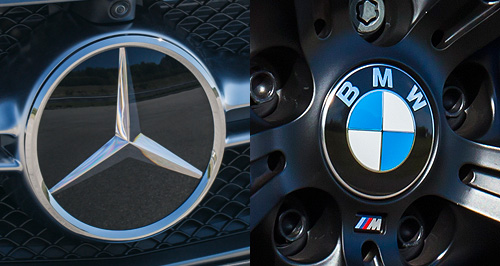Make / Model Search
News - VolkswagenBMW, Mercedes deny emissions riggingReturn fire: BMW Group and Mercedes-Benz parent company Daimler have reacted strongly to speculation that their vehicles flout emissions regulations as the scandal facing Volkswagen Group deepens. German giants BMW and Mercedes resist being drawn into diesel emissions scandal28 Sep 2015 BMW Group and Mercedes-Benz’s parent company Daimler have officially distanced themselves from the diesel emissions rigging scandal engulfing German compatriot Volkswagen Group, following speculation that their vehicles also exceed legal emissions limits. The luxury car giants have both issued statements over the weekend denying that they manipulate emissions figures to meet regulations. German magazine Auto Bild has been forced to publish a clarification on an article claiming the NOx (oxides of nitrogen) emissions of a BMW X3 were 11 times higher than the legal limit, and Daimler has publicly hit back at speculation from non-government organisation German Environmental Aid (DUH). BMW’s statement said the company is “committed to observing the legal requirements in each country and fulfilling all local testing requirements”. “In other words, our exhaust treatment systems are active whether rolling on the test bench or driving on the road.” Meanwhile, Daimler “categorically denies the accusation of manipulating emission tests regarding our vehicles”. “A defeat device, a function which illegitimately reduces emissions during testing, has never been and will never be used at Daimler,” said the company in a statement. “This holds true for both diesel and petrol engines. Our engines meet and adhere to every legal requirement.” In defending itself against the Auto Bild accusation, BMW cited two studies performed by the International Council on Clean Transportation (which discovered the discrepancies in VW vehicles “confirmed that the BMW X5 and 13 other BMW vehicles tested comply with the legal requirements concerning NOx emissions”. Auto Bild was made to publish the following clarification: “No evidence of emission manipulation by BMW…. The values mentioned in the document were only generated in a single, one hour-long road test. Auto Bild has no access to the details of this test trail, which might explain the discrepancies to the NEDC (New European Driving Cycle) test.” BMW also pointed out that “no discrepancies were found in the X5 between laboratory-test and field-test NOx emissions”. “Clear, binding specifications and processes are in place through all phases of development at the BMW Group in order to avoid wrongdoing,” said the company. Referring to seven questions posed by DUH, demanding answers within just a few hours, Daimler confirmed “that none of the allegations apply to our vehicles. The technical programming of our engines adheres to all legal requirements”. “We have no knowledge of measurements that indicate our vehicles did not meet legally required standards … we work closely and constructively with the responsible authorities in Germany, Europe and the United States and will willingly provide any vehicle for testing.” Daimler also pointed out that it is “evaluating legal options pertaining to the approach taken and the public assertions made by the DUH”. DUH has also implicated Ford and Opel in its accusations of widespread noncompliance with European emissions legislation, but neither company has yet responded publicly. However responses to its requests were published on the DUH website, with Ford denying use of a “so-called defeat device”. “Our vehicles and engines – including the highly modern diesel engines – comply with the European low emission,” said the response from Ford (translated from German). Opel said that “GM developed software does not have any features that detect whether a vehicle is just in emission test cycles” (also translated from German). “Modern Diesel driving is indispensable for the achievement of European climate change objectives.” BMW echoed Opel’s sentiment about the importance of diesel engines in achieving CO2 emissions reduction targets. “Policymakers worldwide, and in particular in the European Union, are setting tough standards for CO2 and other emissions. The 2020 targets in Europe can only be fulfilled through extensive use of modern diesel engines and further electrification,” it said. “The progress achieved so far in CO2 reduction in Europe is largely due to the use of diesel technology. Meeting future requirements will not be feasible without diesel drive trains, since a diesel engine emits roughly 15 to 20 per cent less CO2 on average than a comparable petrol engine.” Both BMW and Daimler pledged to assist with European efforts to develop new testing methods that will more accurately replicate the emissions and fuel consumption of real-world driving.  Read more28th of September 2015  Mueller confirmed as VW boss as crisis deepensPorsche chair Matthias Mueller to lead Volkswagen as EA189 diesel crisis deepens25th of September 2015  Authorities pushing VW Australia on emissions scandalHigh-level sacking reports emerge as Volkswagen Australia comes into the picture24th of September 2015  Opinion: Cheats never prosperVolkswagen’s incomprehensible decision to deceive buyers24th of September 2015  VW diesel scandal: Winterkorn steps downMartin Winterkorn departs VW Group to allow ‘fresh start’ amid emissions scandal23rd of September 2015  VW diesel scandal grows to 11 million carsVolkswagen Group diesel emissions scandal spreads to 11 million vehicles worldwide |
Click to shareVolkswagen articlesResearch Volkswagen Motor industry news |











Facebook Twitter Instagram